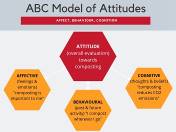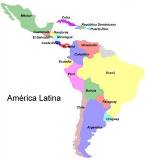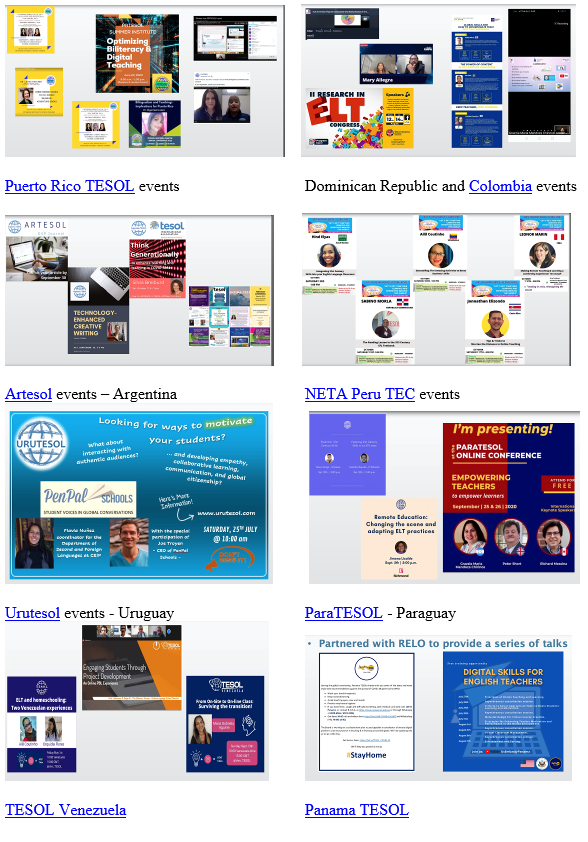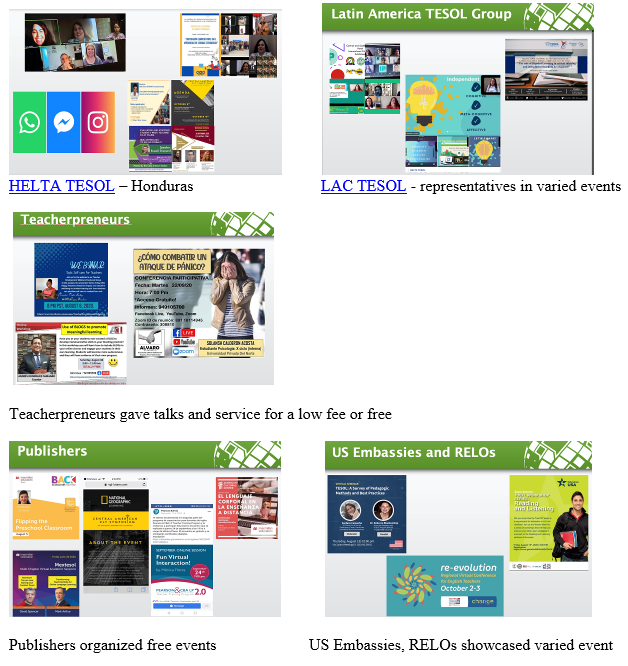The Power of Education Networks
Grazzia Maria Mendoza Chirinos, M.Ed.,M.A., Passionate teacher trainer committed to contribute to ongoing professional development. In the field of education for 28 years and currently education specialist at USAID Honduras. Has written about CALL in ELT, Competency Based Language Teaching, Leadership. Enjoys working with teachers and educators to promote ongoing professional development. Email: grazziem01@yahoo.com

Introduction
Collaboration is a key component of teacher empowerment and translates in the organization and building of strong communities of practice or teacher networks.
This article will discuss how educator networks in the Latin American and Caribbean region has had and have an impact in empowering educators and building leadership competencies. It will describe how the theory is visible through the work academics and associations from the Latin America and Caribbean (LAC) region and have built a powerful network where projects are shared, events and training are organized, opportunities to collaborate are created translating into a cohesive, empowered group of educators who work and share experience, learning and collaboration, with the added value of an unexpected outcome such as long-lasting friendships.
Research related to educator networks
There has been ample research on the benefits of educator networks and it has shown that it affects those involved beliefs, attitudes and practice (Cole & Weinbaum, 2010; Finnegan & Daly, 2012), they are an important influence on outcomes of reform (Coburn, Russell, Kaufman, & Stein, 2012; Penuel, Sun, Frank, & Gallagher, 2012), and they can either create or constrain access to resources such as expertise (Baker-Doyle & Yoon, 2010; Frank, Zhao, & Borman, 2004; Penuel et al., 2010).
In this article we will see with real life examples if relationships are “the conduits for knowledge, then understanding those relationships will help us build capacity for improvement and change”.

Among the lessons learned in the body of research there are 5 that should be highlighted. First, teachers tend to seek advice from those with whom they have established a strong professional relationship. Next, teachers also seek advice of those who in leadership positions. Moreover, there is not perception that those who give advice are necessarily the ones that are more experienced which means experience does not mean lack of interest in continued learning. Also, connections play an important role as these can lead to potential projects and collaboration. Finally, interactions are key to collaboration, adapting similar techniques or actions in varied contexts, promote the dissemination of new ideas and consequently change in teaching practices.
From research we can then conclude that educator networks provide an advantage to spread expertise, resources, best practices, lessons learned and overall enhance and promote changes in teaching practices.

Why engage in educator networks?
There are a variety of reasons why an educator would choose to engage in networks. Those who engage in professional teacher associations such as TESOL International Association or IATEFL for the purpose of continuous professional development, but especially for the networking aspect of teachers from all over the world. Being part of these associations allows those members to learn from other contexts and compare/contrast realities. In addition, it allows teacher members to engage in productive collaboration and projects that have a direct impact in their practice, in the classroom, and in their students learning. The Education Support Partnership for example supports educators in areas related to mental health. The Inter-agency Network for Education in Emergencies seeks to empower members all over the world to work together to ensure the right to quality and safe education worldwide for those teaching in crisis and conflicts contexts. Actions of the network seek to create change in countries where there is war, high crime, or high out migration.
This means that no matter the purpose of the network, the ultimate goal is collaboration for the purpose of improvement and in turn for the greater good. The reason for this is that educators can use their interpersonal or connection skills to draw value from this collaboration and build empowering relationships that have an influence in their individual teaching contexts.
Examples of collaboration in the Latin American and Caribbean (LAC) region
We are all aware that teachers need to feel a sense of belonging to each other and to their profession. They need to form a supportive community of lifelong learners that will be there when times get tough, and when individuals may think they are the only ones struggling with such things as classroom management or differentiated instruction.
The LAC region has been engaging in collaboration for many years, namely since 1984. There have been times when collaboration is high and sometimes low, but on March 2010, after several members reconnected in Boston, and after the participation of over 30 representatives of the region in the HELTA (Honduran English Language Teachers Associations) TESOL convention in 2018 in Tegucigalpa the LAC TESOL network has become a space for its representatives, members, association to a) improve skills and knowledge, b) re-ignite motivation and purpose, c) generate solutions and initiatives to serve the larger TESOL community, d) promote changes, and e) and become a hub for learning improvement, ongoing professional development and work opportunities.
To understand more about what has happened in the region over the last years it is important the reader knows who the LAC TESOL group is and then some of the things and activities that the group has developed, but especially how collaboration has gone from simple activities to more complex projects forming a strong educator network.
The LAC TESOL group has representatives from 23 countries in the region which include: Cuba, Puerto Rico, Dominican Republic, Haiti, Trinidad and Tobago, Mexico, Guatemala, Belize, El Salvador, Honduras, Nicaragua, Costa Rica, Panama, Venezuela, Ecuador, Colombia, Peru, Argentina, Bolivia, Brazil, Chile, Paraguay, and Uruguay. Representatives in each country may solely represent the country or might be a representative from a TESOL affiliate. Representatives usually bring news from their countries and/or associations and take back news from events where representatives attend as a group. There are usually biennial meetings in collaboration with the annual convention of the country selected for this purpose, and there is also an annual meeting during the TESOL International convention, hence the reason why there are representatives from TESOL affiliates and why this is a common denominator among representatives.

In 1984 an agreement was signed in San Pedro Sula Honduras to organize affiliates in one regional group the Mexico, Central America and Caribbean Basin Regional TESOL group or CA&CB Regional TESOL Group. At the same time a South Cone TESOL formed in South America. Since then, collaboration meant attending each other conventions and being part of each of the activities every two year. Around 1994, the group lost momentum and activities slowed down.
From 2010 to 2015 the group saw a reactivation thanks to the thanks to the work of MEXTESOL through the leadership at the time Ms. Maria Trapero, Ms. Pia White, Ms. Araceli Salas and Mr. Ulrich Schrader. The purpose at the time was reactivating the group and especially support the reactivation or organization of associations in countries where there were none. A clear result of these actions were the organization of ANPI NICA TESOL in Nicaragua, reactivation of the Honduran association through HELTA TESOL and organization of Belize TESOL. In addition, reconnection to the group of TESOL Venezuela, ASOCOPI from Colombia, GELI Cuba and PRTESOL from Puerto Rico. During this period many new representatives started to join the group and participate in events as speakers or participants. The Panama TESOL convention in 2012, during Mr. Joel Alvarez presidency, marked an important year as RELO expressed the interest in supporting the group and ensuring ongoing support for professional development events. The highlight of this period was the reconnection and birth of new associations.
From 2016-2019 important milestones were reached, one was the attendance of over 30 representatives from 20 countries of the region to the HELTA TESOL 2018 Annual Convention and 14th Biennial CA&CB Regional Group Conference thanks to the leadership of Ms. Grazzia Mendoza and sponsorship of the US State Department. During this convention a motion to unite the Latin American and Caribbean region was passed by the Honduran representative, Ms. Mendoza, and this was supported unanimously by all members. The Latin American and Caribbean Basin TESOL group came to be and this decision was ratified in 2019 during ASOCOPI national convention. During these years also several projects came to life, thanks to the engagement of the group via WhatsApp. Actions included sharing best practices, cultural contrasts, employment opportunities, monthly online webinars and a collegiality that meant strengthening the bonds of the group and maintaining constant communication. Associations advertised events in their website and social media pages, setup a schedule to participate in the monthly online webinars led by VenTESOL in Venezuela, under their then President Ms. Mary Allegra’s leadership. The HELTA TESOL hosting the Biennial convention, unification of the region and monthly online webinars where the highlight of this period.
During the period of 2020-2021 even greater things happened. The group came together more than ever and the first example was the January ELT4 Puerto Rico event put together in less than three weeks by Henrick Oprea from BrazTesol and Rob Howard from EFL Talks where it was evident that as professionals the group could come together to support those in need using their expertise. The event brought together 93 academics and experts who in 24 hours delivered sessions to hundreds of participants to raise funds for earthquake relief for Puerto Rico.

Then the pandemic hit, and everyone was forced online, this created an even flow of events, sharing of resources, invitation to online conventions either as speakers or participants. It was evident the whole region was working towards ensuring everyone had access to enough resources to face this new shift in education. Some of the images below (image section) describe the events and it is evident for the reader that not only the countries came together but larger professional associations sought engagement, editorials found ways to serve teachers, universities and different stakeholders had the professional development of teachers in mind. Many resources came available for free or for a low fee to ensure accessibility, but above all these efforts created long lasting partnerships that still stand today. During this period the highlight has been the consolidation of collaboration and strengthened partnerships among members.
For 2022 there are many projects in store which include a Leadership Forum for Women in collaboration with HELTA TESOL through the Hornby Trust and the TESOL International Association Womentorship PLN, a mentorship program in collaboration with EVE: Equal Voices in ELT, collaborative article writing through an OPEN Access ELT book led by Valentina Canese and Susan Spezinni from Paraguay, and many more activities!
Conclusion
When reflecting about the power of educator networks we see in the examples and actions by LAC TESOL that the 5 lessons learned from research are clear. It is evident that the group has created a bond throughout the years because of the professional relationship that exists. Usually, the leaders of associations and leaders within the group are sought out for advice. However, the levels of experience in the group are so varied, that advice is sought from everybody and comes from all ends; sometimes it is just sparked by a question or comment in WhatsApp that leads to a variety of ideas or proposals. The re-connection in 2010, strengthened and consolidated in 2018 has played an important role in visualizing and organizing all the projects that were described. All interactions have brought empowerment, changes, new opportunities, new insights, and perspectives.
The LAC TESOL group has come together, worked together, and collaborated extensively allowing growth and empowerment!
This is a testimony of the power of educator networks!
References
Baker-Doyle, K.J. & Yoon, S.A. (2010). Making expertise transparent: Using technology to strengthen social networks in teacher professional development. In A.J. Daly (Ed.), Social network theory and educational change (pp.115-126). Cambridge, MA: Harvard Press.
Coburn, C.E., Russell, J.L., Kaufman, J.H., & Stein, M.K. (2012). Supporting sustainability: Teachers’ advice networks and ambitious instructional reform. American Journal of Education, 119, 137-182.
Cole, R.P. & Weinbaum, E.H. (2010). Changes in attitude: Peer influence in high school reform. In A.J. Daly (Ed.), Social network theory and educational change (pp. 77-96). Cambridge, MA: Harvard University Press.
Farley-Ripple, E.N. & Buttram, J.L. (2013). Harnessing the power of teacher networks. Phi Delta Kappan, 95 (3), 12-15
Images section


Please check the Pilgrims f2f courses at Pilgrims website.
Please check the Pilgrims online courses at Pilgrims website.
Uplifting Sunken Spirits – Using Music to Explore, Empower & Enlighten
Chris Walklett, UKThe Power of Education Networks
Grazzia Maria Mendoza Chirinos, Honduras